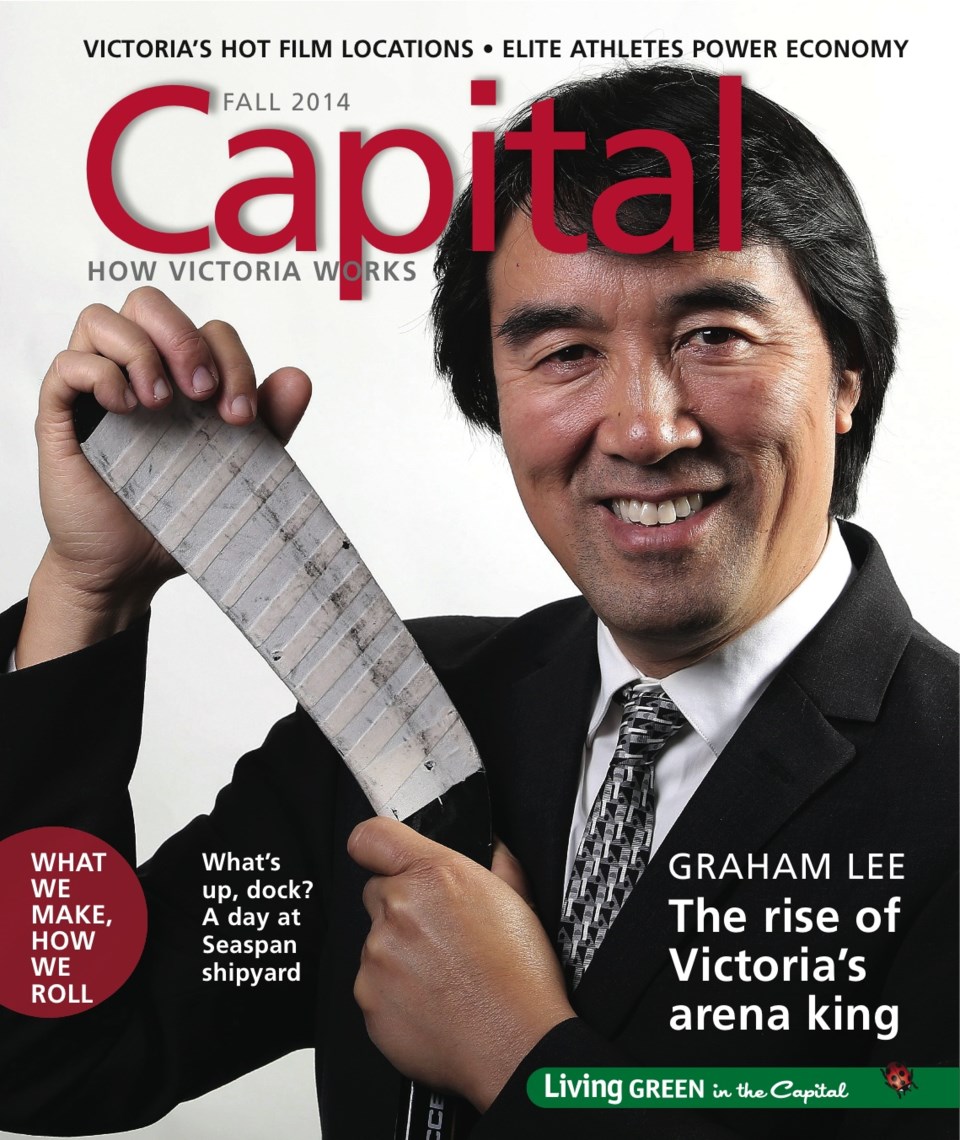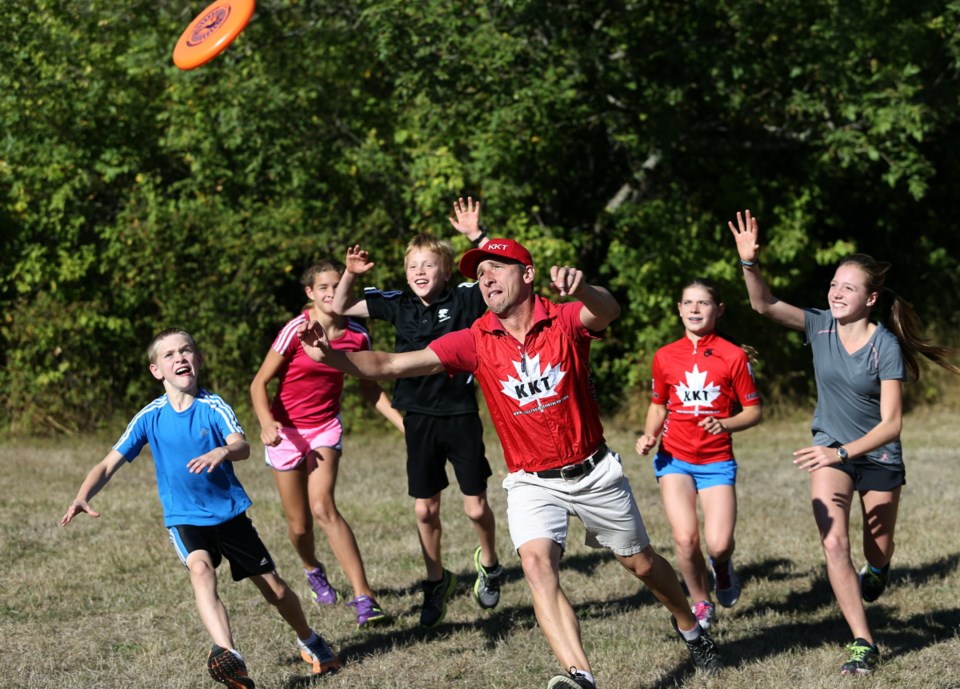The black and pink Cervélo road bike and signature pink Giro d’Italia jersey are set up in Trek Bikes like a shrine, welcoming customers to the Vic West bike shop.
And it’s not out of the realm of possibilities for Ryder Hesjedal to be hanging around the shop, catching up with longtime friend Troy Woodburn, the bike mechanic who helped him conquer the 2012 Giro d’Italia, solidifying his place as one of the top cyclists in the world. The store’s strong ties withthe 33-year-old cyclist from Metchosin is sometimes the factor that brings people through the door and inspires amateurs to pick up the sport, said co-owner Bill Fry.
And Hesjedal’s role in spearheading the Tour de Victoria allows relatively new cyclists to rub shoulders with some of the country’s top athletes during the 140-kilometre ride through the region.
With a forgiving climate and ample terrain for training, Greater Victoria’s status as a hub for elite athletes has had a drag-up effect for recreational athletes, creating a culture of fitness and fostering an industry that shows no signs of slowing.
The spin-off economic effects are myriad, from specialty sport shops to state-of-the-art training centres and gyms to coaching services. That web also reaches countless businesses that benefit from the thousands of athletes who flock here for races such as the Victoria Marathon.
Rob Reid, running guru, Frontrunners owner and race director for the GoodLife Fitness Victoria Marathon, said the 1994 Commonwealth Games were a major driver in Victoria promoting health and sport as a brand.
“Victoria just has the climate to attract lead athletes. We end up with an industry building around it,” Reid said.
 |
|
Click on the cover to read the fall 2014 issue of Capital magazine online |
Watching elite athletes train has a contagious effect, he said, where some people pick up a sport or activity just to be part of it all.
Reid said if you took a bird’s-eye view of the city, every street would likely have a cyclist or a runner. “It’s really impressive.”
“[People] don’t necessarily come here to make millions, but they come here to enjoy the lifestyle of what our geography and what our brand is.”
Reid sees the economic opportunities in pushing that brand — “fittest city in Canada.”
“That’s something we should be using as far as our marketing,” he said.
Reid pointed to the GoodLife Fitness Victoria Marathon as a measurable example of how much recreational running has grown.
“I’ve been involved in the Victoria Marathon for 26 years and I remember when we barely broke 1,000 people in the early 1990s. And now we’re attracting 12,000.”
Mark Nelson is the man who tracks those athletes as they cross the finish line, someone whose business relies on milliseconds. Nelson operates Race Day Timing, which provides registration and time-keeping services for big races across Vancouver Island and the province.
The company has grown from working 16 events in 2009 to almost 90 events this year in B.C.
Nelson said while the elite racers are definitely entertaining to watch in a big race such as the Times Colonist 10K, the majority of people running the race are doing it as a personal goal or as a social event.
“I think the masses are going to these events because of the community we have in Victoria, the gyms, the fitness centres, the sporting-goods stores and all the coaches that are trying to build their own businesses and, as a result, adding these new people to the fitness pool,” Nelson said.
Former pro triathlete Kelly Guest said the crop of elite athletes also inspires younger generations to follow in their footsteps. Guest moved to Victoria from London, Ont., in 1999 to train alongside Simon Whitfield on the men’s national team.
“In my own story, I was kind of a product of the hub that is elite sport in Victoria,” he said. “I was here to get better and this is the place to do it. It doesn’t matter what sport you’re in — cycling rowing, running, triathlons — it’s happening here.”
Guest now runs Kelly’s Kids Triathlon, a coaching service for kids between the ages of 10 and 16.
He’s priming them to be the country’s top-level athletes and there’s no shortage of former Olympians at their races to provide the motivation they need to get there. Whitfield often comes out to training sessions to talk to the kids and answer their questions.
“I think it’s that proximity to greatness that helps the kids realize that they can do it,” Guest said.
Like Guest, many former pros have started coaching businesses.
One of Guest’s students, Hannah Henry, 14, is aiming to join the junior elite triathlete team next year, which would have her training six times a week.
It’s part of her goal to one day make it to the Canada Summer Games and beyond that, to the Olympics.
Hannah said she looks up to professional athletes such as Kirsten Sweetland, former world junior triathlon champion, who was at the B.C. Summer Games in her hometown Nanaimo in August.
Hannah’s mother, Della Henry, said interacting with top athletes at these competitions is a huge motivator for her daughter. “It makes the whole sport more real and attainable,” Henry said.
Reid said when Simon Whitfield returned from Sydney with his gold medal, he asked him to show up at a track-and-field event for students.
“I thought, ‘This will be like Beatlemania,’ ” he said, and the result wasn’t far off, with young athletes squealing after a high-five from the triathlete and peppering him with questions.
Elk Lake has been the training ground for many rowers who have eventually stood atop an Olympic podium, from Silken Laumann, who captured bronze in the 1992 Olympics in Barcelona just weeks after a serious injury to her leg, to the men’s eight team that captivated the country with their gold medal finish in Beijing in 2008.
“I think rowing has a much higher profile in Victoria than it does in many other parts of Canada,” said Brenda Taylor, an Olympian who brought home two gold medals from the 1992 Olympics. She now works as the club manager at Victoria City Rowing Club.
The club is housed in the Victoria Rowing Society boathouse at Elk Lake, which is also shared by the Canadian national team, the University of Victoria and the Greater Victoria Youth Rowing Society.
“The boathouse at Elk Lake is bursting at the seams,” Taylor said.
There’s an annual Christmas rowing event in which national athletes, masters, juniors and UVic students are thrown into the same boat.
The club also hosts major events such as the National Rowing Championships, B.C. Championships, the Canadian Masters Championships and regattas hosted by UVic.
“So there’s a lot of high-level athletes training here and that trickle down affects everybody,” Taylor said. “It’s just a culture of fitness and activity whether you’re a competitive high-performance athlete or masters athlete or recreational athletes doing it for fitness.”
